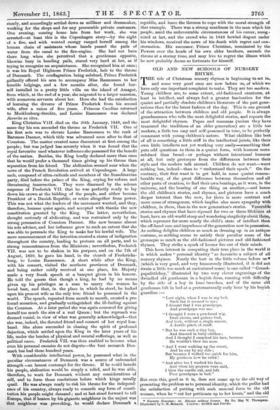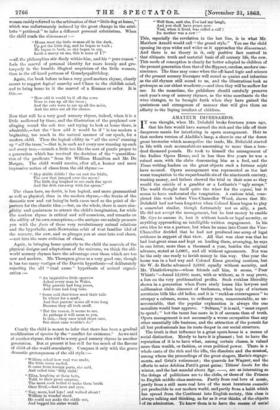OLD AND NEW SCHOOLS OF NURSERY RHYME.
MHE tide of Christmas nursery rhymes is beginning to set in,.
and some very good ones are now before us, of which we have only one important complaint to make. They are too modern.
Young children are, to some extent, o/d-fashioned creatures, at least in intellect, and always feel a greater fascination for the quaint and partially obsolete children's literature of the past gene- rations than for the latest fashion of the day. This is one ground of the attraction between children and old people. It is always grandmamma who tells the most delightful stories, and repeats the most delightful rhymes. Papas and mammas (unless they have treasured the traditions of an older generation) are a little too
modern, a little too easy and self-possessed in tone, to be perfectly
consonant with young children's nature. What children like best of all is something a little stiff in the intellectual joints, like their own little intellects not yet working very easily—something that puts odd questions to them in a quaint form, with humour more
subdued than broad—or perhaps without intentional humour at all, but only grotesque from the differences between their style and the modern talk around. Children do not want—want nothing less, indeed—than to "understand their epoch." On the contrary, their first want is to get hold, in some quaint remem- berable way, of the great difference between themselves and all other parts of creation, to find their qwn bearings, as it were, in the universe, and the bearing of one thing on another,—and hence the old children's stories, and rhymes, and pictures have a much deeper interest than the new, for there is more contrast and more sense of strangeness, which implies also more sympathy with
children, in them, than in the new generation's stories. Venerable stories and rhymes that have ripened for two or three lifetimes at
least, have an old-world stoop and wondering simplicity about them, which represent far more nearly the child's state of intellect than the off-hand ease and impudence of the generation now in possession. As nothing delights children so much as dressing up in an antique costume, so nothing seems to satisfy their peculiar sense of the grotesque so much as the old-fashioned pictures and old-fashioned rhymes. They strike a spark of keener fire out of their minds.
This keen interest in computing their true place in the world it is which makes " personal identity " so favourite a subject of all nursery rhymes. Nearly the best in the little volume before GB* (which is very good, and very humorously illustrated, if it did not strain a little too much at caricatured noses) is one called " Grand-
papalittleboy," illustrated by two very clever engravings of the dwindled old gentleman in a boyish dress, running with difficulty by the side of a boy in knee breeches, and of the same old gentleman left in bed at a preternaturally early hour by his boyish guardian :—
" Last night, when I was in my bed, Such fun it seemed to me;
I dreamt that I was grandpapa, And grandpapa was me.
"I thought I wore a powdered wig, Drab shorts, and gaiters buff, And took, without a single sneeze, A double pinch of snuff.
"But he was such a tiny boy, And dressed in baby-clothes ; And I thought I smacked his face, because He wouldn't blow his nose.
"And I went walking up the street, And he ran by my side ; But because I walked too quick for him, My goodness how he cried !
"And after tea I -washed his face, And when his prayers were said, I blew the candle out, and left Poor grandpapa in bed."
But even this, good as it is, does not come up to the old way of presenting the problem sate personal identity, which the pedlar had the satisfaction of putting with such unusual force to the old woman, when he "cut her petticoats up to her knees," and the old • Nursery Nonsense; or, Rhymes without Reams. By Dr. May W. Thespien. Illustrated by C. H. Bennett. London: Griffith and Ferran. woman rashly referred to the arbitration of that "little dog at home," which was unfortunately induced by the great change in the attri- bute " petticoat " to infer a different personal substratum. When the child reads the djnouement
Home went the little woman all in the dark, Up got the little dog, and he began to bark ; He began to bark, so she began to cry, Lank a mercy on me, this is none of I !"
—all the philosophies stir dimly within him, and his "pure reason" feels the marvel of personal identity far more keenly and gro- tesquely in the humble illogical scepticism of the little woman, than in the off-hand pertness of Grandpapalittleboy.
Again, the book before us has a very good modern rhyme, clearly meant to suggest logical anarchy and Chaos to the childish mind, and to bring home to it the marvel of a Kosmos or order. It is
" How odd, it would be if all the cows Were to run up all the trees ; And the cats were to eat up all the mice, And the mice eat all the cheese.
Now that will be a very good nursery rhyme, indeed, when it is a little mellowed by time; and the illustration of the perplexed cow slinging round the oak tree and trying to look at home there, is admirable,—but the "how odd it would be if "is too modern a beginning, too much in the natural manner of our epoch, for a modern child. Then the logical oddity in "all the cows" running up" all the trees,"—that is, in each and every cow running up each and every tree,—sounds a little too like the sort of puzzle proper to a generation which has received the doctrine of the "quantifica- tion of the predicate" from Sir William Hamilton and Mr. De Morgan. The child would receive, after all, a keener and more impressive notion of chaos from the old rhyme :—
" Hey diddle diddle ! the cat and the fiddle, The cow that jumped over the moon! The little dog laughed to see such fine sport And the dish ran away with the spoon.'
The chaos here, no doubt, is less logical, and more grammatical as well as physical, than in the modern rhyme,—the freaks of the domestic cow and cat beinein both cases used as the point of de- parture for the chaotic idea ;—but, on the whole, there is more sim- plicity and quaintness to attract the child's imagination, for while the modern rhyme is critical and self-conscious, and remarks on the oddity of its own conceptions,—the antique one calmly presents you with the facts of those very revolutionary animal relations and the hyperbolic, anti-Newtonian orbit of that familiar idol of the nursery, the cow, and so plunges you at once into real chaos, —not into the mere criticism of chaos,
Again, in bringing home quaintly to the child the marvels of the physical designs and adaptations of the universe, we think the old- world nursery rhymes have the advantage over those which are too new and modern. Mr. Thompson gives us a very good one, though it has too many vestiges of the Darwin hypothesis—of deliberately rejecting the old "final cause" hypothesis of animal organi- zation :—
4' An inquisitive little sparrow Asked every man in Wales, Why parrots had long noses, And foxes had long tails.
"Some said that foxes used their tails In winter for a muff; And that parrots' noses all were long Because they all took snuff.
"But the reason, it seems to me, As perhaps it will seem to you, Is this,—they once tried short ones, But short ones wouldn't do."
Clearly the child is meant to infer that there has been a gradual modification of species by the "conflict for existence." As we said of another rhyme, this will be a very good nursery rhyme in another generation. But at present it has still far too much of the flavour of child-of-the-world oracularity. Compare it only with the grave dramatic grotesqueness of the old style :—
"William asked how veal was made, His little sister smiled.
It came from foreign parts, she said, And called him Silly child.'
"Eliza, laughing at them both, Told, to their great surprise, The meat cook boiled to make them broth Once lived,—had nose and eyes.
"Nay, more, had legs! and walked about ! William in wonder stood.
He could not make the riddle out, And begged his sister would. "Well then, said she, I've had my laugh, And you shall have yours now. Veal, when it lived, was called a calf ! Its mother was a cow!"
This, especially the revelation in the last line, is in what Mr. Matthew Arnold would call "the grand style." .tou see the child opening its eyes wider and wider as it approaches the denouement. And there is no theory in it, onlY positive fact centred in that ultimate truth and material basis of all nursery life, the cow. This mode of conception is clearly far better adapted to children of the present generation than thatof the flippant, careless, moderdom- niscience. The time may come when the off-hand logic and science of the present nursery literaiims will sound as quaint and infantine
as the old rhymes still sound to us, and the illustrations look as grotesque as our oldest woodcuts ;—and then they will be mellow for use. In the meantime, the publishers should carefully preserve
each year's crop of nursery rhymes, as the wine merchants do the wine vintages, to be brought forth when they have gained the
quaintness and strangeness of manner that will give them an affinity to the lisping intellect of children.































 Previous page
Previous page